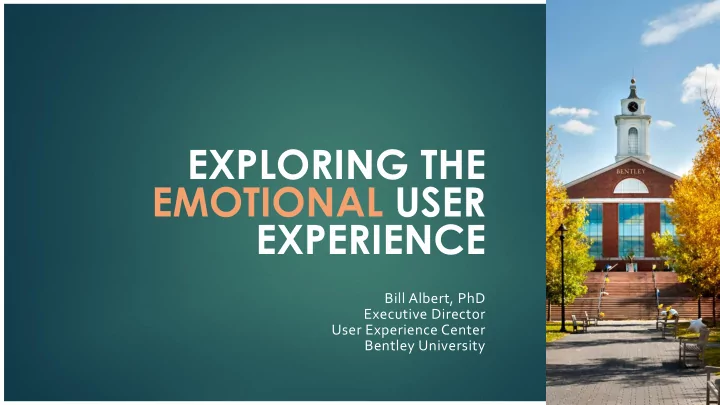

EXPLORING THE EMOTIONAL USER EXPERIENCE Bill Albert, PhD Executive Director User Experience Center Bentley University
2 • Motivation • 5 challenges • Defining the emotional UX • Measuring the emotional UX • Getting started
3
4 A tough nut to crack! Natural evolution • Unique challenges • Big upsides •
5 5 Challenges
6 1. Emotions are fleeting
7 2. Highly contextual Does not like Reluctant feeling “under Just had a bad Participant the day at work microscope”
8 3. Weak signals High Emotional Intensity Roller coaster ride Being on a great first date Team winning the “big game” Watching a scary movie Friend telling a funny story Critical error on software Frustrated with a website Enjoying a new app Low Emotional Intensity
9 4. Driven by content “$1.3 million looks good to me, oh and the software looks great too.”
10 5. Noisy Data
11 Defining the Emotional User Experience
12 Arousal Valence Happy: calm excited negative positive Tense: calm excited negative positive
13 Six dimensions of the emotional UX Engagement Confidence Stress Emotional UX Trust Affect Frustration
Engagement 14 bored apathetic indifferent motivated excited
Stress 15 peace calm concern nervous tension stress panic “I was just trying to buy Beyoncé tickets.”
Affect 16 anger sad disappointed neutral content happiness joy
Frustration 17 delight relief annoyance frustration pain Interrupting the buying process Easy Check-Out to create an account
Trust 18 distrust skeptical open trust blind faith Hidden fees at checkout Verifying news sources on social media
Confidence 19 lack of confidence confident highly confident “What am I even buying?” “How do I know if this is what I need?” “This makes no sense”
20 Measuring the Emotional UX
21 Measuring the Emotional UX Behavioral / Self-Report Physiological
Microsoft’s Product Reaction Cards 22 www.uxforthemasses.com/product-reaction-cards www.microsoft.com/usability/UEPostings/ProductReactionCards.doc
Standardized 23 Questionnaires EMO (Emotional Metric Outcomes) James R. Lewis & Daniel K. Mayes, Development and Psychometric Evaluation of the Emotional Metric Outcomes (EMO) Questionnaire
Example Likert Statements 24 On a scale from 1 to 5, how much do you disagree or agree with the following statements: 1 = strongly disagree, 5= strongly agree Engagement Stress Affect This <system> is fun to use Using this <system> makes This <system> makes me me stressed mad/angry I would look forward to I feel anxious (or nervous) I like using this <system> using this <system> in the when I use this <system> future I would rather use this This <system> has a calm Using this system brings <system> than <other> or peaceful feel to it me joy/happiness I would want to use this My tension increases When I am finished using <system> in my free-time when I use this <system> this <system> I feel good I am bored when I use this I feel relief when I use this I don’t like using this <system> <system> <system>
Example Likert Statements 25 On a scale from 1 to 5, how much do you disagree or agree with the following statements: 1 = strongly disagree, 5= strongly agree Frustration Trust Confidence I feel frustrated when I use I would feel comfortable I feel confident when I this <system> sharing my personal use this <system> information with this <system> This <system> is easy to I would feel comfortable I feel I am making the use giving my credit card to right choices when using this <system> this <system> I feel annoyed when I use I feel this company is I feel unsure about the this <system> trustworthy terminology I feel I am efficient when I I feel this company has I feel confident when I am use this <system> my best interests in mind looking for information This <system> is delightful This <system> is I feel I have to guess to use transparent, with nothing when I use this <system> to hide
Emojis 26 www.premotool.com/about-premo/ www.uxmatters.com/mt/archives/2016/09/beyon d-the-lab-gathering-holistic-qualitative-user- experience-data.php www.lemtool.com
27 Net Emotional Value (NEV) Average Positive Average Negative NEV Emotions Emotions calm relief frustration skeptical happiness open lack of confidence confident tension content bored delight trust disappointed motivated http://customerthink.com/new-cx-measure-to- compliment-nps-net-emotional-value/
28 Measuring the Emotional UX Behavioral / Self-Report Physiological
29 Behavioral Observation Naturalistic observation Coding sheet
EDA and EEG 30 EDA (electrodermal activity EEG instrument to measure sensor) electrical activity on the scalp
Heart Rate Variability / Pulse (BPM) 31
32 Affectiva’s Q-Sensor (EDA)
33 Facial Expressions www.imotions.com/emotient/
34 Facial Expressions Demo
35 Eye Tracking
36 iMotions Demo Starts at: 5:17
37 Get Started
38 What do I use? Metric Data Collection Method Engagement Self report, EDA, Eye Tracking, behavioral observation, Stress Self report, EDA, BP/HRV Affect Self report, facial expression analysis, behavioral observation Frustration Self report, behavioral observation Trust Self report, behavioral observation Confidence Self report, behavioral observation
39 Starter Questions • What emotions are relevant? • What methods/technologies can be used to collect data about the emotional UX? • What will the data tell (and not tell) you? • How will you use the data to inform design or product strategy?
40 Tips for Success • Triangulate metrics to understand a single emotion • Holistic approach to the emotional UX (many emotions) • Approach data skeptically • Validate with qualitative methods • Measure impact and disseminate
THANK YOU Bill Albert, PhD Executive Director Bentley UXC walbert@bentley.edu www.bentley.edu/uxc
Recommend
More recommend